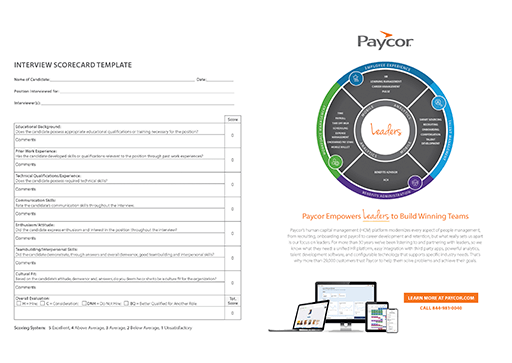It’s not always easy to make good hiring decisions. And, it can be tempting to go with your gut to save time when assessing and comparing candidates. But to improve the chances of finding the ideal candidate every time—and eliminate any potential biases—you’ll want to have a standardized evaluation process. The good news is, an interview scorecard can help you narrow down top talent, even during the initial interview. Additionally, using interview scorecards as an evaluation tool for your candidates can help serve as a good indicator of future success in the workplace.
Interview Scorecards by Definition
An interview scorecard is a document that is used to score and rate candidates during an interview process. Pre-hire and assessment tools are helpful for you to narrow down your candidate pool in a short amount of time, but scorecards help to ensure that all candidates are evaluated fairly and consistently. They can also be used to track the progress of a candidate’s interview process.
Immediate Benefits of Scorecards
Of course, it’s not always easy to translate aspects of a candidate’s personality into a numerical rating scale, but if every interviewer takes the time to do it right it’ll make your hiring process a lot more efficient and fairer in the long run. Additionally, a structured approach makes it easier to be objective, and avoid being swayed by hunches.
Interview Scorecards for Better Hiring Decisions
Feature Highlights
Uncovering both strengths and weakness requires asking the right job-related questions, but it also means evaluating answers in a consistent and structured way.
This is even more important when interviews are conducted by more than one person. If structured interviews are analyzed in a standardized way, evaluations can be understood (and compared) by anyone in an organization, rather than just one recruiter.
Our free interview scorecard template walks you through the best ways to hire top talent, and you can customize it to meet your organization’s specific needs.
Eliminating Hiring Biases
It’s a lot easier to avoid bias when using a standard set of interview questions that are asked. Having a set list of questions helps to ensure that all candidates are judged on their merits rather than their personal characteristics.
This also saves time and resources in the long run, as unstructured interviews may require more time to evaluate the applicants. Providing an objective way to evaluate candidates will help to ensure that the hiring process is fair and equitable. Evaluating candidates after an interview is also an important part of the process.
Organizations spend 70% of their operating budgets on talent acquisition-related expenses, it’s astonishing how rare it is for organizations to measure the success of interviewers in their ability to select the right talent. With Paycor Recruiting, you’ll have the tools to measure hiring managers, interviewers, and recruiters who are statistically prone to making the best hiring decisions.
Pros and Cons of Interview Scorecards
While we’ve covered a lot of the benefits, it’s important to weigh both sides of using interview scorecards.
Pros
- Hiring process moves faster
A hiring scorecard helps streamline the process by allowing hiring managers to quickly and easily compare candidates against each other. This eliminates the need to go through resumes one by one, which can greatly speed up the process. Additionally, scorecards make it easier to identify the best candidates, since all of the relevant information is in one place. This can help reduce time-to-hire and improve employee retention.
- Mainly focusing on score sheets
Interview score sheet templates allow for a more consistent evaluation of candidates, as they provide a framework for rating each candidate. Score sheets can help identify areas where a candidate may be weak, which can help improve the overall quality of the pool of candidates interviewed. Having score sheets also makes it easier to track the progress of individual candidates over time, allowing for better assessment of their development.
- Interview Score Cards can be used legally
Scorecards can be used legally in an interview process because they help to remove bias from the hiring decision. Hiring managers can rate candidates against each other on the same criteria, which helps to ensure that the best candidate is selected for the role.
Cons
- Candidate Scorecards don’t deviate from the process
When it comes to making hiring decisions, it’s important that everything is done fairly and consistently. Interview scorecard questions help ensure this by providing a structured way of evaluating candidates. Deviating from the process could lead to unfairness and bias, which could ultimately impact the decision made about who gets the job.
However, you may want to deviate from the process every now and then. In this case, you should meet with your team and discuss why you feel a deviation is necessary and how it could impact the hiring decision. It’s important to always consider the fairness of your process when making changes. You’ll need a consensus within the group, and that may take up time.
- Requires more time and effort
An interview scorecard requires more time and effort because it takes into account factors that are not easily quantifiable, such as a person’s character and work ethic. In addition, creating a scorecard allows for a more holistic evaluation of a candidate, which can help to ensure that the best possible hire is made. Initially, it takes more time and effort, but in the end, it can lead to hiring the best of the best and streamlining the process.
What is Included in an Interview Scorecard Template
An interview scorecard template has a number of helpful features. With our free interview scorecard template, you can fully customize it to add the qualifications that you look for when hiring. Some common criteria include the following:
- Educational Background
Some roles will require a certain level of educational achievement. - Prior Work Experience
Has an applicant’s career up to this point prepared them for this new role? - Technical Qualifications / Experience
Does the candidate have the specific skills needed? - Communication Skill
All jobs require some level of communication skill—has the applicant shown enough in the interview to show they’ll be able to succeed? Do they have soft skills? Soft skills may be harder to score, but you can create criteria that show someone has them. - Enthusiasm/Attitude
Is it clear that the applicant is passionate about the opportunity? Will their attitude be well-suited to your organization? - Teambuilding/Interpersonal Skills
Most jobs aren’t just about working—they are about working together. Does the candidate have the skills (and willingness) to be a team player? - Cultural Fit
Finding a candidate that is a company culture fit can be an organization’s special sauce and it’s important to find top talent who will build, sustain and thrive within a culture, and avoid those who just won’t fit. - Overall Evaluations
Taking all these categories into account, interviewers can add any further comments and issue a recommendation of whether a candidate should be hired or not.
How Paycor Helps
When it comes to interviews, Paycor has 2 great resources to help you.
Interview Scheduling Feature Highlights
First, Paycor Recruiting’s interview scheduling tools are easy to use, integrate with Outlook and Gmail, and since you don’t pay extra for users you can schedule interviews with anyone on your hiring team!
Gmail and Outlook
Paycor Recruiting offers employers the deepest integrations to MS Outlook and Gmail so scheduling an interview email is easy. Unlike many of our competitors, with Paycor Recruiting you don’t have to use third-party interview appointment software just because you use Outlook. Add all of your interviewers to Paycor Recruiting at no extra charge and have everyone’s calendars at your fingertips.
Invitations that write themselves
Stay on-brand and send the most buttoned-up interview invitations every time – automatically. Paycor Recruiting’s interview email templates auto-fill the name of the interviewers, their titles, and any special instructions or directions designed to prepare and confirm the candidate for the interview. Remember, well prepared interviewers and interviewees is the key to smart interviewing. Invite your team, invite your candidate, and track accepts and declines without using a third-party interview scheduling app.
Need to reschedule?
When schedulers are finished scheduling and sending the invites, Paycor Recruiting will inform you when the candidate and your team has confirmed the interviews. Smart alerts are easily configured to warn interview schedulers if an interviewer has not confirmed an interview or needs to reschedule. And, if someone needs to reschedule, Paycor Recruiting will assist the you with rescheduling without starting from scratch.
And finally, download our free interview scorecard template to create a custom interview scorecard in minutes that will help you easily recruit, and retain top talent.











